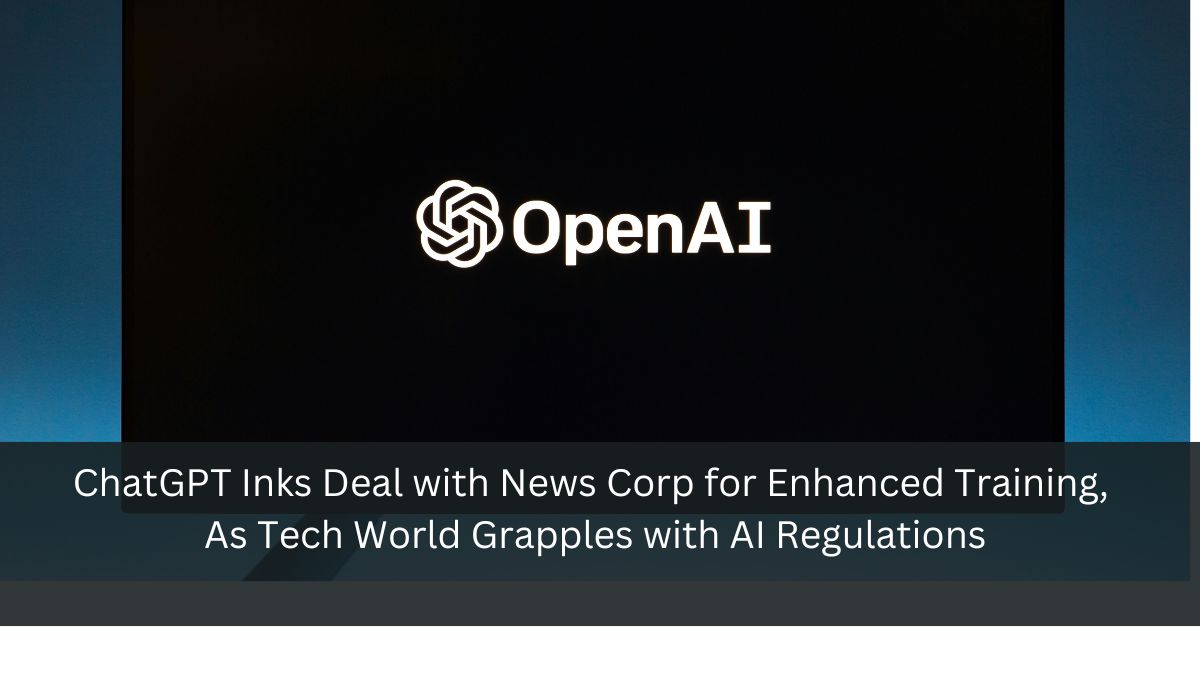Uncategorized
ChatGPT Inks Deal with News Corp for Enhanced Training, As Tech World Grapples with AI Regulations

In a significant development for the world of artificial intelligence, OpenAI, the developer behind the immensely popular chatbot ChatGPT, has announced a multi-year deal with media giant News Corp. This partnership will allow ChatGPT to access and train on articles from esteemed publications such as The Wall Street Journal, The London Times, The New York Post, and The Sun. The move marks a major step forward in the evolution of AI language models and their ability to provide users with up-to-date, relevant information from trusted sources.
The Power of Media Partnerships
OpenAI’s collaboration with News Corp is not the first of its kind. In recent years, the AI developer has forged similar partnerships with other media organizations, including Germany’s Axel Springer Group, France’s Le Monde, and the United Kingdom’s Financial Times. These strategic alliances have allowed ChatGPT to expand its knowledge base and improve its ability to engage in informed conversations on a wide range of topics.
However, not all media companies have been enthusiastic about the use of their content for AI training. In December, the New York Times filed a lawsuit against OpenAI, alleging that ChatGPT had been trained on the newspaper’s articles without permission. This legal action highlights the complex issues surrounding intellectual property rights and the use of copyrighted material in the development of AI systems.
The Importance of Responsible AI Development
As the capabilities of AI language models like ChatGPT continue to grow, so too do concerns about the potential risks and ethical implications of this technology. The European Union is currently poised to enact historic regulations on artificial intelligence, aiming to create a balanced ecosystem where AI can thrive while adhering to ethical standards and human rights.
The EU’s proposed AI regulations seek to establish a framework that ensures transparency, accountability, and fairness in the development and deployment of AI systems. By setting a global benchmark for AI governance, the EU hopes to foster innovation while mitigating potential harms and unintended consequences.
The Need for Clear Regulations
The debate over AI regulation is not limited to the European Union. In the United States, the House of Representatives recently approved a bill that seeks to establish a new regulatory regime for digital currencies, despite a rare warning from the Securities and Exchange Commission (SEC) about potential financial dangers.
The bill, sponsored by Republicans and approved with bipartisan support, aims to improve regulatory clarity and foster the development of the cryptocurrency industry. However, the SEC has expressed concerns that the legislation could lead to new financial risks and vulnerabilities.
The House’s vote comes on the heels of the SEC’s announcement that it is likely to allow spot ether exchange-traded fund (ETF) applications, a move that has provided an unexpected boost to the cryptocurrency industry. This development highlights the complex and often conflicting priorities of regulators, legislators, and industry stakeholders when it comes to emerging technologies like AI and blockchain.
The Future of AI and Society
As AI continues to advance at a rapid pace, it is clear that we are entering a new era of technological innovation and disruption. The partnerships between AI developers like OpenAI and media organizations like News Corp are just one example of how this technology is transforming the way we access and engage with information.
However, with great power comes great responsibility. As we navigate this new frontier, it is crucial that we develop clear and effective regulations that balance the benefits of AI with the need to protect individual rights, promote transparency, and ensure accountability.
The EU’s proposed AI regulations are a step in the right direction, but much work remains to be done. Policymakers, industry leaders, and civil society organizations must work together to create a framework that allows AI to reach its full potential while minimizing the risks and unintended consequences.
Significance of the Partnership
The partnership between OpenAI and News Corp marks a significant milestone in the evolution of AI language models and their ability to provide users with timely, relevant, and trustworthy information. As ChatGPT continues to learn from some of the world’s most respected media outlets, we can expect to see even more impressive advances in its capabilities and performance.
At the same time, the debate over AI regulation and governance is only just beginning. As we grapple with the complex ethical, legal, and social implications of this transformative technology, it is essential that we remain vigilant and proactive in developing clear and effective guidelines for its development and use.
The future of AI is bright, but it is up to us to ensure that it is also a future that benefits all of humanity. By working together and staying true to our values of transparency, accountability, and fairness, we can harness the power of AI to create a better, more informed, and more connected world for generations to come.
